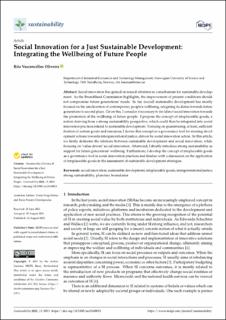Social Innovation for a Just Sustainable Development: Integrating the Wellbeing of Future People
Peer reviewed, Journal article
Published version

Åpne
Permanent lenke
https://hdl.handle.net/11250/2826201Utgivelsesdato
2021Metadata
Vis full innførselSamlinger
Originalversjon
10.3390/su13169013Sammendrag
Social innovation has gained increased attention as a mechanism for sustainable development. As the Brundtland Commission highlights, the improvement of present conditions should not compromise future generations’ needs. So far, (social) sustainable development has mostly focused on the amelioration of contemporary people’s wellbeing, relegating its duties towards future generations to second place. Given this, I consider it necessary to (re-)direct social innovation towards the promotion of the wellbeing of future people. I propose the concept of irreplaceable goods, a notion deriving from a strong sustainability perspective, which could then be integrated into social innovation practices related to sustainable development. Focusing on guaranteeing, at least, sufficient fruition of certain goods and resources, I devise this concept as a governance tool for steering development actions towards intergenerational justice, driven by social innovation action. In this article, we firstly delineate the relations between sustainable development and social innovation, while focusing on ‘value-driven’ social innovation. Afterward, I shortly introduce strong sustainability as support for future generations’ wellbeing. Furthermore, I develop the concept of irreplaceable goods as a governance tool in social innovation practices and finalize with a discussion on the application of irreplaceable goods in the assessment of sustainable development strategies.
